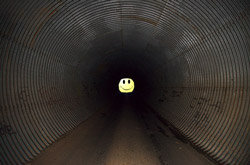The writing world is full of dystopias, both in- and outside of our favourite genres. I have read and enjoyed quite a few of them, but I personally think that dystopia as a literary form has—with precious few exceptions—become a tired cliché, a one-sided mannerism and a default defence mechanism of an unambitious approach to writing.
And this in the middle of Dystopia Week here at Tor.com? Well, I’ve been asked to provide a counterpoint (hopefully not the only one), a differing opinion. So here goes.
One of the major problems with the dystopian form (I’ll get to other problems in later posts) is that it, almost by definition, asks certain one-sided assumptions from both the writer and the reader, and sticks to them at all costs. I call this the “dystopia tunnel vision.”
(Yes, I realise that fiction—of all kinds—requires a certain suspension of disbelief. However, I think that the dystopian form takes a too single-sided approach to this.)
In your average dystopia, a society is oppressing its citizens, or a certain part of them. Hence, in order for that oppressive society to come into existence, certain grand assumptions must be made:
- Technologies with more intrusive possibilities will always be used to form or sustain a total surveillance society (either by the government—1984—or by megacorporations—most of the cyberpunk genre).
- Innovative technologies, scientific advances and new social and cultural developments will almost always be used for the bad and/or oppression of mankind.
- Advances in medical science, such as cloning, (extreme) longevity or cures for diseases will always be used by the oppressors, indefinitely, either for their personal gain and/or to suppress the population.
- The oppressive government (or megacorporation) is almost always infallible, each and every one of its faitful servants are inhumanly competent and/or cold-hearted (or mean).
In reality, an oppressive regime’s control over its people is rarely all-encompassing, and the soldiers, guards- and policemen carrying out the surveillance are fallible humans, who often have a change of heart, or turn a blind eye. Check out Das Leben der Anderen (The Lives of Others): in East Berlin in 1984 (coincidence?) a secret police agent spying on a writer and his lover becomes increasingly absorbed by their lives, and starts to protect them.
In reality, internet services and social media like Gmail, Facebook and Twitter have not singularly led to more oppression (even if prospective employers might check there), but have helped trigger uprising against oppressive societies. Some oppressive regimes are blocking them.
In reality, increased trade—powered by a large part by all these evil megacorporations—has brought economic windfalls to poor countries, and has considerably decreased the rate of poverty worldwide.
In reality, advances in medicine have not been kept to the rich, mighty and privileged indefinitely, but have spread through the population at large, leading to better medicine, increased life expectancy, decreased infant mortality, the eradication of many diseases, and much more.
The benevolent, neutral or wider aspects of new technologies, scientific advancements or social/cultural developments are purposefully ignored: otherwise they might prevent that dystopian society from forming, or weaken it from inside.
This willful neglect of the positive sides of society and new developments is one aspect of the dystopia tunnel vision. Another aspect is the unrelenting tendency to focus only on the problems, while refusing to look at solutions.
I will certainly not deny that there are many problems in today’s society: but dystopian fiction focuses almost exclusively on the problems—to the point of exaggerating, overstating and blowing them out of proportion—and rarely, if ever, tries to come up with actual solutions.
(“But,” I hear some of you say, “it’s not fiction’s function to come up with solutions.” Well, if the “looking forward” of fiction—and especially that of the “forward-looking” genre of science fiction—is only seeing how the world goes to hell in a handbasket, then it’s not particularly imaginative, innovative or ambitious.)
Yes, we need to analyse and understand the problems that are plaguing us. But doing only that will not solve them. Constantly and excruciatingly telling people that they’re doing it wrong, without offering them alternatives, or propose methods for improvement, is ultimately unproductive and threatens to become a self-fulfilling prophecy.
I’m tired of hearing that dystopias are such great cautionary tales. Yes, some of them are. But do we keep using that excuse to delve
[…] the best dystopias speak to the deeper meanings of what it is to be one small part of a teeming civilization… and of what it is to be human.
(From John Joseph Adams’ introduction to Brave New Worlds.)
To which I would add: all too often at the cost of ignoring a civilization’s complexity and good sides… and what it is to be human in a very lop-sided world.
So, utopian fiction is better?
Jetse de Vries: technical specialist by day, SF aficionado by night. Editor (Shine anthology—@outshine on Twitter), short story writer (Flurb, Clarkesworld Magazine, Postscripts, others), and various non-fiction (Interzone, NYRoSF, Focus et al.). Total solar eclipse chaser, whisky/cognac/beer & wine connoisseur, heavy metal maniac and more.










